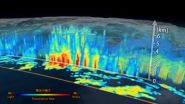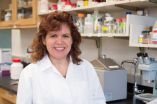(Press-News.org) Scientists have shown for the first time that a chemical in the brain called galanin is involved in the risk of developing depression.
And the research, undertaken by a European research team, points to a strong reason to develop drugs that modify galanin functioning as a new class of antidepressant drug.
Galanin is a neuropeptide (a small protein) that was discovered and investigated over 30 years ago by various groups including the Swedish scientist Tomas Hokfelt. He is one of the senior authors of the paper published in the journal PNAS.
Professor Hokfelt and others made the fundamental discovery that neurones can release peptides alongside their classical transmitters and that galanin and noradrenaline are one such pair. Both have long been implicated in pain and stress and therefore depression but in the past it had been difficult to study peptides in humans.
The new research by scientists from Sweden, Hungary and the UK demonstrates that galanin is an important stress mechanism in the human brain that influences how sensitive or resilient people are to psychosocial stress.
Lead author Gabriella Juhasz, who is a Research Fellow at the University of Manchester and the Semmelweis University in Budapest, said: "Our research shows that some versions of the gene coding for galanin protect against the risk of depression and anxiety but only in people who have experienced early life neglect or trauma, or recent adverse events.
"Furthermore, the three genes for the three receptors through which galanin acts also influence the risk of depression in people experiencing early or recent life adversity. Crucially, all the galanin related genes are widely separated on different chromosomes and the odds are stacked against four random genes acting in the same way by chance."
Results from the research indicate that although the results are statistically reliable, galanin effects modify the substantial effects of stress by only a few percent. Indeed the moderate overall genetic influence (about 35%) on depression is likely to be mediated by many small genetic effects interacting with each other and with psychosocial factors converging on stress mechanism in brain.
Co-author Professor Bill Deakin, from the University of Manchester, said: "The findings provide a strong reason to develop drugs that modify galanin functioning as a new class of antidepressant drug. And new drugs are badly needed as almost all commonly prescribed antidepressants act on serotonin and they are often not very effective.
"Our research confirms what previous reports have shown about the variation in the serotonin 'transporter' gene and how it influences the risk of depression. We found that the galanin effects are substantially greater than the effects of serotonin."
The research team also say there is increasing evidence suggesting that depression, obesity, diabetes and Alzheimer's disease may be varying manifestations of shared underlying abnormalities of body metabolism.
"Galanin may be part of this general vulnerability since it has a significant role in appetite and obesity," added Professor Deakin.
INFORMATION:
Notes for editors
The paper, 'Brain galanin system genes interact with life stresses in depression-related phenotypes' by Gabriella Juhasz, Gabor Hullam, Nora Eszlari, Xenia Gonda, Peter Antal, Ian Anderson, Tomas Hökfelt, Bill Deakin and Gyorgy Bagdy is available on request.
Background Notes:
Depressive illness is often triggered by life stresses and adverse events in early childhood such as neglect and abuse make people more vulnerable to later depression. Depressive illness also runs in families and variation in genes (DNA) accounts for about a third of the risk of developing Depressive illness.
Despite the application of advanced DNA mapping techniques spanning the whole genome to large numbers of people with and without depression, no definite evidence has been found for any genes whose variation is associated with depression. This is because such studies are too big to record psychosocial stress on every individual and so genetic factors that work through modifying response to stress cannot be detected.
This study used a novel Bayesian network-based analysis to calculate the relevance of gene – stress interactions in depression. Bayes was an English vicar who proposed his famous theorem in the early 18Th century. It was neglected for a century or more and its elaborations are still expanding into to many aspects of understanding risk. The Bayesian approach offers an efficient new way to identify genetic effects in disorders with a strong environmental component.
The study was carried out in two populations, in Manchester and in Budapest, each with more than a thousand people. They provided blood for DNA and information about their psychosocial experiences and psychiatric symptoms. We confirmed the reliability of self-reported experiences and symptoms by interviewing a subset of 260 participants. The fact that the galanin system findings were the same in both countries and the same in men and women confirms their reliability. END
Research produces strong evidence for a new class of antidepressant drugs
2014-03-26
ELSE PRESS RELEASES FROM THIS DATE:
First images available from NASA-JAXA global rain and snowfall satellite
2014-03-26
NASA and the Japan Aerospace Exploration Agency (JAXA) have released the first images captured by their newest Earth-observing satellite, the Global Precipitation Measurement (GPM) Core Observatory, which launched into space Feb. 27.
The images show precipitation falling inside a March 10 cyclone over the northwest Pacific Ocean, approximately 1,000 miles east of Japan. The data were collected by the GPM Core Observatory's two instruments: JAXA's Dual-frequency Precipitation Radar (DPR), which imaged a three-dimensional cross-section of the storm; and, NASA's GPM Microwave ...
The advantages of entering the workforce in a recession
2014-03-26
Despite the well-documented disadvantages of graduating from college during a recession, could graduates actually be happier with their jobs in the long run?
A new article from Administrative Science Quarterly examines whether earning a college or graduate degree in a recession or an economic boom has lasting effects on job satisfaction. Across three studies, well-educated graduates who entered the workforce during economic downturns were happier with their work than those who first searched for jobs during more prosperous times. In fact, they were happier with their ...
Immunotherapy data heralds new era of lung cancer treatment
2014-03-26
Geneva, Switzerland, 26 March 2014 -- A new era of lung cancer therapy is close to dawning, using drugs that can prevent tumour cells from evading the immune system, experts have said at the 4th European Lung Cancer Congress.
For decades, scientists and doctors thought immunotherapy –treatments that harness the immune system to fight a disease-- was of marginal benefit in lung cancer, says Jean-Charles Soria, Institute Gustave Roussy in Paris, France.
However a new class of drugs known as "immunocheckpoint regulators" have shown huge potential, Soria says. New data ...
Planning and building products and production plants simultaneously
2014-03-26
In early 2010, LANXESS decided to enter a new field of business, water purification: A production facility for Lewabrane reverse osmosis membrane filter elements was supposed to be built by the fall of 2011. Together with the company's experts, researchers from the Fraunhofer Institute for Factory Operation and Automation IFF in Magdeburg designed and had the manufacturing technology ready for production in just nine months. Afterward, they built a second, fully automatic and, therefore, more complex plant in just one year. Part of this plant – scaled down – will be on ...
Harvard scientists visualize new treatments for retinal blindness
2014-03-26
A new report published online in The FASEB Journal may lead the way toward new treatments or a cure for a common cause of blindness (proliferative retinopathies). Specifically, scientists have discovered that the body's innate immune system does more than help ward off external pathogens. It also helps remove sight-robbing abnormal blood vessels, while leaving healthy cells and tissue intact. This discovery is significant as the retina is part of the central nervous system and its cells cannot be replaced once lost. Identifying ways to leverage the innate immune system ...
Genetics can explain why infections can trigger rheumatoid arthritis
2014-03-26
A new international study has revealed how genetics could explain why different environmental exposures can trigger the onset of different forms of rheumatoid arthritis.
A team at the Arthritis Research UK Centre for Genetics and Genomics at The University of Manchester, part of a large international consortium involving scientists from across 15 academic institutions, believe their findings could have important implication for the way that rheumatoid arthritis is diagnosed and treated.
Publishing their findings in the journal American Journal of Human Genetics, they ...
New septic shock biomarker test could boost better interventions
2014-03-26
CINCINNATI – Septic shock is a severe systemic infection and major cause of death for the old and young alike. Unfortunately, researchers say testing new drug regimens to stop the infection is confounded because clinical trials include patients who are either too sick to be saved by experimental therapies or not sick enough to warrant the treatments.
In a study published in the April edition of Critical Care Medicine, researchers at Cincinnati Children's Hospital Medical Center and the University of Cincinnati report a new blood test that helps solve the dilemma by identifying ...
Eat a peach
2014-03-26
PULLMAN, Wash. - A Washington State University food scientist and colleagues at Texas A&M have found that compounds in peaches can inhibit the growth of breast cancer cells and their ability to spread.
Writing in the Journal of Nutritional Biochemistry, the researchers say the compounds could be a novel addition to therapies that reduce the risk of metastasis, the primary killer in breast and many other cancers. The compounds could be given as an extract or, judging from the doses given mice in the study, two to three peaches a day.
"I would do three peaches a day," said ...
The altruistic side of aggressive greed
2014-03-26
KNOXVILLE – In many group-living species, high-rank individuals bully their group-mates to get what they want, but their contribution is key to success in conflict with other groups, according to a study that sheds new light on the evolutionary roots of cooperation and group conflict.
In a series of mathematical models, researchers from the National Institute for Mathematical and Biological Synthesis and the University of Oxford uncovered a mechanism for explaining how between-group conflict influences within-group cooperation and how genes for this behavior might be ...
Recent California symposium highlights women injured in the workplace
2014-03-26
Recent California symposium highlights women injured in the workplace
Article provided by Sacks & Zolonz, LLP
Visit us at http://www.sackszolonzdefense.com
In February the California Applicants' Attorneys Association held a symposium regarding workplace injuries that affect women. "Working Women's Injuries Symposium: Causes, Consequences and Prevention" examined the causes of injuries to women in the workplace and attempted to generate policies that would reduce and better address women's safety while at work.
At the symposium, experts and safety advocates ...


